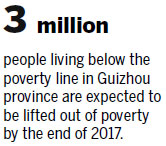
With the booming development of e-commerce and big-data technology, Guizhou province aims to lift millions out of poverty as China makes a five-year dash to help all of its 1.3 billion people have sufficient means for a comfortable life.
Provincial lawmakers have passed the country's first local law on big data, promising support for the industry's development. Passed during a recent meeting of the provincial people's congress, the draft stipulates that big data providers should avoid harming State interests and protect the privacy of individuals and businesses.
In Guizhou's five-year plan (2016-20) to develop its society and economy, big data and big poverty alleviation are highlighted as two major strategies, according Vice-Governor Liu Yuankun.

"This means we will make full use of big data technology to reduce poverty," Liu said.
According to the province, more than 3 million of the remaining 6.23 million people living below the poverty line are expected to be lifted out of poverty by the end of 2017, and all by 2010.
With the help of big-data technology, a "poverty alleviation cloud" has been built, Liu said. The cloud is an electronic platform that pools all updated information about residents living below the poverty line, such as location, reason for low income, subsidies received and what alleviation project covers them.
"By following the data stored in the cloud, we are able to deliver more precise and targeted help," Liu said.
Rough estimates show that the province lifted 1.3 million out of poverty in 2015.
"The Internet has helped Chinese people overcome poverty" said Chris Nebe, CEO of Monarex Hollywood, who is currently filming a documentary about Guizhou.
Contact the writer at yangjun@chinadaily.com.cn